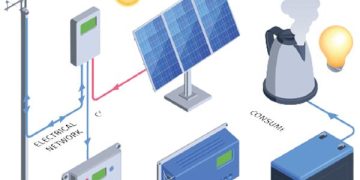In the relentless pursuit of a greener tomorrow, the sun has emerged as a beacon of hope, promising an abundant and sustainable energy source. Yet, as the world races to harness its rays, a shadowy question lingers over the gleaming solar panels: Are developing nations, rich in essential raw materials, being cast as mere stepping stones in this global energy revolution? Nestled beneath their fertile soils and rugged terrains lie the very minerals that fuel the solar industry’s aspirations. But as these nations become key players in the supply chain, concerns arise about the balance of power and fairness in these exchanges. This article delves into the intricate dynamics of this solar quest, examining whether the promise of sustainable energy is marred by exploitation and inequity.
Unearthing the Costs of Solar Advancement
The rapid shift towards renewable energy sources has underscored the critical demand for raw materials essential in the manufacturing of solar panels. Developing nations often find themselves at the heart of this extraction process, raising concerns about the ethical implications of resource procurement. With rich deposits of minerals such as lithium, cobalt, and rare earth elements, these countries are frequently subjected to aggressive mining activities. This can lead to environmental degradation and social upheaval, as communities face displacement and loss of livelihoods. The absence of stringent regulations and enforcement mechanisms further exacerbates the exploitation risk, leaving local populations vulnerable to the whims of international corporations.
- Environmental Impact: The extraction process can result in significant damage to local ecosystems, affecting biodiversity and water resources.
- Social Consequences: Indigenous communities often suffer the most, as they lose access to ancestral lands and resources.
- Economic Disparity: While profits soar for multinational companies, the economic benefits for local communities remain minimal.
Addressing these challenges requires a concerted effort to promote sustainable mining practices and enforce fair trade policies that prioritize the welfare of local populations. Ensuring that the transition to clean energy does not come at the expense of vulnerable communities is crucial for achieving truly sustainable development.

The Human and Environmental Toll of Raw Material Extraction
The extraction of raw materials for solar energy, particularly in developing nations, presents a dual challenge. On one hand, these countries often possess rich deposits of essential minerals like lithium, cobalt, and rare earth elements, which are critical for the production of solar panels and batteries. However, the process of extracting these resources can be both environmentally and socially devastating.
- Environmental Degradation: Mining activities frequently lead to deforestation, soil erosion, and contamination of local water supplies. This not only disrupts ecosystems but also impacts agricultural productivity and the livelihoods of local communities.
- Social Impacts: Often, the benefits of mining are not equitably shared. Local populations may face displacement and loss of land rights, while experiencing little improvement in their economic conditions. Furthermore, labor conditions can be dire, with reports of unsafe working environments and inadequate wages.
Ultimately, while the demand for solar raw materials is driven by a global push towards renewable energy, the consequences of extraction must be carefully managed to ensure that developing nations do not bear an undue burden. Balancing the needs of global sustainability with local development and environmental stewardship remains a complex challenge that requires international cooperation and responsible governance.

Balancing Economic Growth with Ethical Sourcing
In the race towards a sustainable future, the solar energy industry has seen unprecedented growth. However, this rapid expansion has raised significant questions regarding the sourcing of essential raw materials like lithium, cobalt, and rare earth elements. Developing nations, often rich in these resources, find themselves at the center of a complex web of economic opportunity and ethical dilemmas. While these materials can be a financial boon, the exploitation of local labor and environmental degradation are pressing concerns that need addressing.
Several challenges complicate the landscape of ethical sourcing in these regions:
- Labor Practices: Workers in developing countries may face poor working conditions, inadequate wages, and limited rights.
- Environmental Impact: Mining for solar raw materials can lead to deforestation, soil erosion, and water pollution.
- Economic Disparities: While multinational corporations profit, local communities may see minimal economic benefits.
As the demand for solar energy continues to grow, it is imperative for stakeholders to implement sustainable and fair practices that respect both human rights and the environment. By doing so, the industry can help ensure that the pursuit of clean energy does not come at the cost of the world’s most vulnerable populations.

Strategies for Equitable Resource Management in Solar Industries
To ensure that solar industries operate with fairness and responsibility, it’s crucial to implement strategies that balance resource extraction with community welfare. Developing nations, often rich in raw materials necessary for solar technology, face the risk of resource exploitation. One approach to address this is through inclusive partnerships between corporations and local governments. These partnerships should prioritize the socio-economic development of communities involved in resource extraction.
Key strategies include:
– Transparency in Contracts: Clearly defined terms and conditions that are accessible to the public.
– Local Workforce Development: Investing in education and training programs to empower local populations.
– Environmental Safeguards: Implementing strict environmental regulations to protect ecosystems.
– Fair Compensation: Ensuring that communities receive equitable financial benefits from resource extraction activities.
By focusing on these strategies, solar industries can foster sustainable growth while respecting the rights and livelihoods of the communities that provide essential raw materials. Such measures not only contribute to ethical business practices but also pave the way for long-term economic stability in developing regions.
Closing Remarks
As we stand on the precipice of a new era in renewable energy, the narrative surrounding the exploitation of developing nations for solar raw materials serves as a poignant reminder of the complexities interwoven within the fabric of progress. While the sun’s promise of a brighter, cleaner future beckons, it casts long shadows that we must diligently examine. It is not merely a question of harnessing energy from the skies, but of grounding our endeavors in ethical practices that honor both the planet and its people. As the world pivots towards sustainability, let us ensure that the rays of advancement illuminate equitable opportunities for all, forging pathways that reflect both innovation and integrity. In this dance of light and shadow, may we find a harmonious balance that uplifts every corner of our shared world.


































